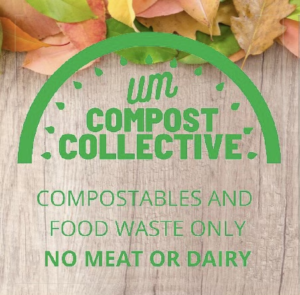Why should you care about composting?
Composting is a key technique for fighting climate change and increasing ecological sustainability: it reduces methane and carbon dioxide emissions, decreases landfill usage, decreases water and air pollution, and creates a nutrient-rich soil additive!
When discarded food makes its way to the landfill and is buried under other trash, it will decompose anaerobically, meaning without environmental oxygen present. This kind of decomposition produces a significant amount of methane, which is a greenhouse gas that traps heat 84 times more than carbon dioxide does over a ten-year period. This sort of decomposition also takes a long time to complete, so food waste contributes greatly to landfill space usage. Increasing the time a substance is bioactive increases the opportunity for disease spread and pollution to occur. There are several ways in which we can reduce waste — shop thoughtfully, donate unused food, and cook appropriate portions of food. Composting is an excellent way to utilize food scraps that cannot be donated and would otherwise be thrown away.
Composting utilizes ubiquitous microorganisms to decompose food waste aerobically, producing a lot of heat and a little carbon dioxide. This method of organic aerobic decomposition greatly reduces the environmental impact of our three square meals a day. A good method to measure your emissions reduction is this: a pound of composted food prevents about 3.8 pounds of carbon dioxide from entering the atmosphere! The byproduct of this process is a nutrient-rich soil called humus, which is most often used as a soil-additive or an eco-friendly fertilizer substitute. This is an important aid to ecological sustainability, since adding compost to the soil adds nitrogen, phosphorus, potassium, and a host of other nutrients, all of which are vital for soil health and structure, and microbial activity. Rather than throwing food waste into the garbage, you can transform it into a material that will improve your local environment. Composting is also an excellent way to prevent overcrowding our landfills; proper addition of water, soil, and food waste can produce high-quality compost in less than two months!
If you’re interested in learning more, or in starting your own composting, check out our Composting Handbook:
-Section By Compost Collective Intern Matt Knerr
Compost Collective
Collective Change in the Community
We all know the Three Rs–Reduce, Reuse, Recycle. However, what is common knowledge isn’t always common practice. While it is easy to feel overwhelmed by the many ways to get involved and practice sustainability locally; within the Lafayette, Oxford, and University (LOU) community; students, staff, and community members can find engagement in sustainability initiatives both easy and accessible.
The UM Compost Program is one of the most recent sustainable developments for the LOU community. Since its launch in 2013, the compost program has diverted more than 130,000 lbs of food waste from landfills. This number continues to grow and is projected to grow even more with the development and launch of the UM Compost Collective.
The UM Compost Collective, which utilizes previously implemented elements of the UM Compost program, is a group initiative on the part of the UM Office of Sustainability, on-campus dining facilities, and community partners towards the reduction and repurposing of pre-consumer wastes.
 UM Compost Collective
UM Compost Collective
The UM Compost Collective promotes community-oriented action towards waste reduction. A large portion of incurred food waste comes from pre-consumer foods. With a student body of roughly 22,000, it is no surprise that the University of Mississippi constitutes a substantial portion of total food waste. However, food waste is not a localized issue and one that extends into our community–particularly for restaurants and local food providers. Having the availability of a compost collective allows for the increased diversion of food waste and greenhouse gas emissions as well as the increase of healthy, rich soil that can be repurposed for gardening. Composting is a cycle, so it only makes sense to develop a program that is equally systemic; meaning, community food waste is repurposed within the same local food system for the promotion of sustainable food production and overall soil quality.
WHAT IS PRE-CONSUMER WASTE?
Pre-consumer food refers to food scraps that are generated before they reach the consumer. Fruit and vegetable peels, coffee grounds, eggshells, and pasta are among the many food waste options that allow for pre-consumer composting. While it is possible to compost both pre and post-consumer foods, pre-consumer foods work to limit potential contaminants and vermin as well as help to reduce decomposition time. Foods to avoid in compost are those heavy in oils and fat, including meat, bones, and dairy.
HOW CAN I GET INVOLVED?
The UM Compost Collective is not open to individual contributions, but you can feel good knowing that your on-campus pre-consumer food waste is being diverted and repurposed through the compost program. Luckily, contributions to food waste reduction do not end there. Starting your own compost pile is a great way to practice sustainability at home. Similarly, shopping at Farmers’ Markets and shopping locally is another great way to contribute to local food systems. Volunteering with local groups such as Oxford Community Market, Flower of Life Food Rescue, and Hill Country Roots also plays an important and active role in sustainability. No matter how small a sustainable contribution may seem, the collective effort of our individual actions helps to mitigate larger environmental issues.
-Section By Compost Collective Intern Allegra Latimer
